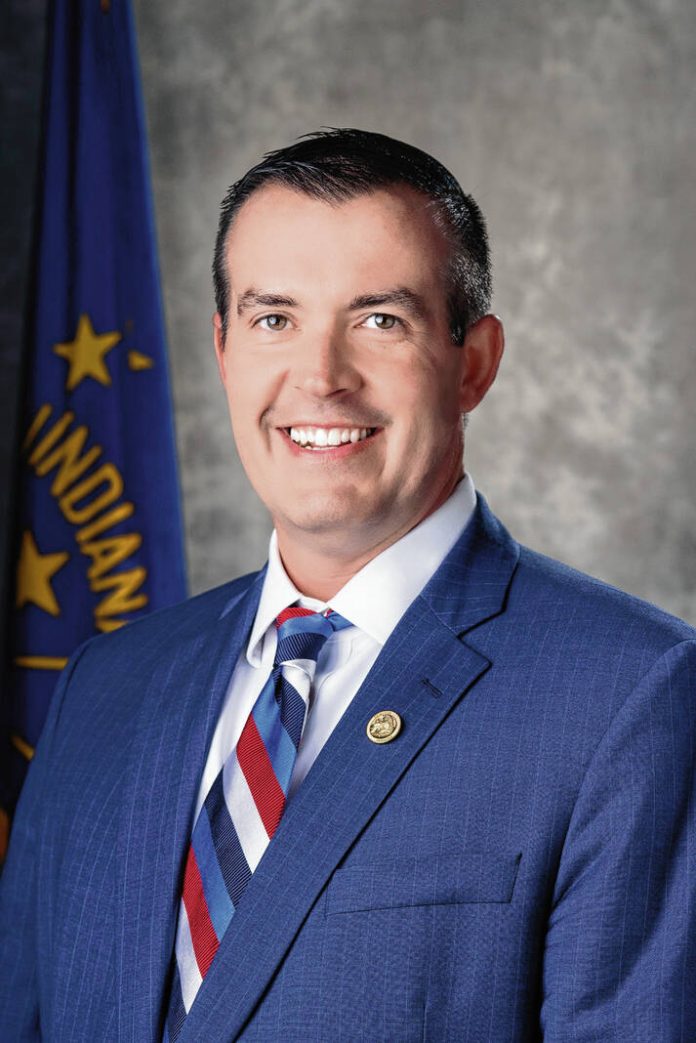Lawmakers on the Indiana House Roads and Transportation Committee heard nearly three hours of testimony Tuesday on Senate Bill 52, mostly from opponents who said the legislation would jeopardize the future of the Blue Line bus rapid-transit project and cause Indianapolis to lose out on $150 million in federal infrastructure improvements.
Of the 60 individuals who took the microphone, only about a dozen individuals who represented local businesses along the Washington Street corridor voiced support for the legislation.
Following testimony, committee chair Rep. Jim Pressel, R-Rolling Prairie, delayed any amendments and a vote on the bill until Feb. 27. That is the final day House committees can hear Senate bills.
The legislation by Sen. Aaron Freeman, R-Indianapolis would put a moratorium on shared lanes for transportation projects and on the city’s ability to install no-turn-on-red signs. The latter was part of an agreement between Freeman and Hogsett administration officials to derail a retroactive piece of legislation that would have required Indianapolis to remove nearly 100 signs installed throughout the city.
Previous versions of Freeman’s legislation targeting IndyGo have made it through the Senate but were brought to a halt in the House. This session, a meeting of several Irvington business owners along the Blue Line route with House Speaker Todd Huston, R-Fishers, might turn the tide. Some business owners in the group have since switched their stance, but others still testified in favor of the bill Tuesday.
As planned, the Blue Line would span 25 miles east to west along Washington Street and provide rapid-transit access to and from the Indianapolis International Airport. It would bring with it $150 million in federal infrastructure investments for Washington Street.
Brandon Herget, director of the Indianapolis Department of Public Works, testified that the city has deferred work on Washington Street in anticipation of those funds.
Despite a $284 million capital infrastructure budget—the highest level of investment Indianapolis streets have seen in years—Herget said the city would be unable to make up the shortfall and would likely have to defer other maintenance projects.
This was exemplified in late 2022. When IndyGo saw projected costs for the Blue Line balloon $300 million more than projected, from $220 million to $520 million, the agency decided to forgo a segment of Washington Street west of Holt Road.
The city invested $20 million in asphalt repairs and drainage upgrades from Holt Road to Lynhurst Drive in an attempt to make up for the $50 million in infrastructure improvements the Blue Line had promised the area. Herget testified that to absorb the cost of this project, the city had to delay two planned improvements in Wayne Township.
The Blue Line infrastructure improvements along Washington Street would include construction of nine miles of new sidewalk, seven miles of road paving and stormwater drainage improvements.
State Rep. Ed DeLaney, D-Indianapolis, said the Blue Line is a key part of the overall public transportation system in Indianapolis.
“As a resident of Indianapolis, I take advantage of the Red Line that runs through my district to get to work or other parts of the city,” DeLaney said in written remarks issued after Tuesday’s testimony. “I observe firsthand the people benefitting from the service of public transportation … The catch is that the Red Line is not complete until the Blue Line is complete. The project was designed as a network of bus routes that connect to bring passengers from the north and east side all the way to the airport. Public transit in Indianapolis will not be fully operational without the completion of the Blue Line, which is dependent on federal grant money. Eliminating the construction of new dedicated lanes shuts off access to $150 million in federal grants, effectively killing the Blue Line.”
DeLaney said “the General Assembly has no business forcing Indianapolis to forfeit funding that would improve the lives of its residents. State legislators should not try to become road designers. I want my City-County Council to be allowed to do their job.”
Freeman said the city has failed to maintain Meridian and Washington streets and is leaning on IndyGo’s transit lines to provide a “bailout.”
In addition to putting a moratorium on construction of dedicated lanes for the Blue Line, the bill would also extend the work of the Funding Indiana’s Roads For a Stronger, Safer Tomorrow Task Force to include discussions on the value of shared lanes and no-turn-on-red signs in downtown Indianapolis. He also mentioned the prospect that the committee study a state takeover of Meridian and Washington Streets.
If the legislation passes, IndyGo interim CEO Jennifer Pyrz said the transit agency would have to pull its application for the Federal Transit Agency’s Small Starts grant program and instead seek funding through the FTA’s New Starts program. That would extend the time it takes to build out the the transit system and include more stringent guidelines and a more competitive application process.
Developers joined residents, who cited safety concerns and the potential that the Blue Line will slow traffic, in opposing the legislation.
Jeremy Stephenson, owner of 1820 Ventures, testified against the bill. His company is carrying out an $250 million-plus development at the former Angie’s List campus that he said would be negatively affected if the Blue Line project were to not move forward. Nearly all of the 20 planned tenants of the campus, Elevator Hill, are in favor of access to the rapid-transit line, he said.
On the other side, Washington Street businesses Markin Sales, Builders First Source, Giltman’s Glass Service and Fusek True Value Hardware all had representatives express favor for the bill and against IndyGo’s usage of dedicated lanes.
By Taylor Wooten of Indianapolis Business Journal





